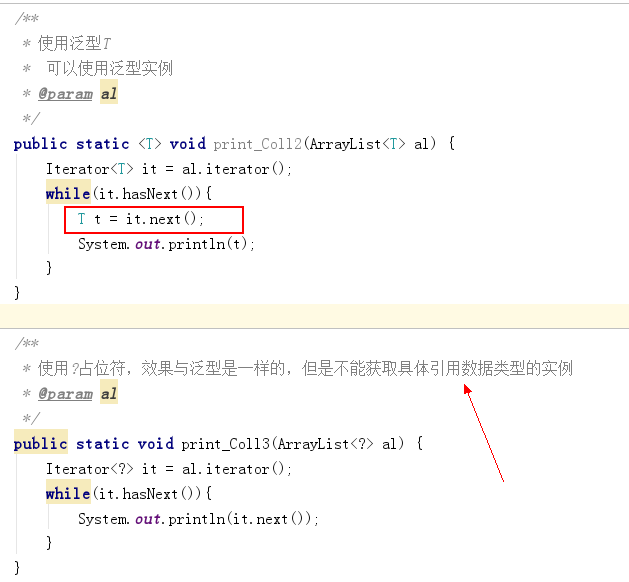泛型限定
发布时间:『 2019-05-13 20:40』 博客类别:java基础 阅读(671)
? 通配符,也可以理解为占位符
泛型的限定:
? Extends E:可以接受E类型或者E的子类型,上限定
? Super E:可以接受E类型或者E的父类型



?与泛型T在使用上的区别

相关代码
package com.javaxl;
import java.util.*;
/**
* @author 小李飞刀
* @site www.javaxl.com
* @company
* @create 2019-05-14 7:04
*/
public class GenericDemo2 {
public static void main(String[] args) {
// method_1(args);
// method_2(args);
method_3(args);
}
/**
* ?占位符的出现
* @param args
*/
public static void method_1(String[] args) {
ArrayList<String> al = new ArrayList<>();
al.add("java01");
al.add("java02");
al.add("java03");
al.add("java04");
ArrayList<Integer> al2 = new ArrayList<>();
al2.add(11);
al2.add(22);
al2.add(33);
al2.add(44);
// print_Coll(al);
// print_Coll(al2);
// print_Coll2(al);
// print_Coll2(al2);
print_Coll3(al);
print_Coll3(al2);
}
/**
* ?上限定应用
* @param args
*/
public static void method_2(String[] args) {
ArrayList<GenericDemo2_Person> al = new ArrayList<>();
al.add(new GenericDemo2_Person("java01"));
al.add(new GenericDemo2_Person("java02"));
al.add(new GenericDemo2_Person("java03"));
ArrayList<GenericDemo2_Student> al2 = new ArrayList<>();
al2.add(new GenericDemo2_Student("java01"));
al2.add(new GenericDemo2_Student("java02"));
al2.add(new GenericDemo2_Student("java03"));
print_Coll4(al);
print_Coll4(al2);
}
/**
* ?下限定应用
* 当treeSet和treeSet2都传入GenericDemo2_Student_Comp时,是不可行的,因为comparator接口做了向上限定
* 但是都传入GenericDemo2_Person_Comp是可行的,简单说实现Comparator接口,接口中泛型可以填写student的父类
* 这样的话即可以比较student,也可以比较person
*
* @param args
*/
public static void method_3(String[] args) {
TreeSet<GenericDemo2_Student> treeSet = new TreeSet<>(new GenericDemo2_Person_Comp());
treeSet.add(new GenericDemo2_Student("java01"));
treeSet.add(new GenericDemo2_Student("java03"));
treeSet.add(new GenericDemo2_Student("java02"));
TreeSet<GenericDemo2_Person> treeSet2 = new TreeSet<>(new GenericDemo2_Person_Comp());
treeSet2.add(new GenericDemo2_Person("java01"));
treeSet2.add(new GenericDemo2_Person("java03"));
treeSet2.add(new GenericDemo2_Person("java02"));
print_Coll5(treeSet);
print_Coll5(treeSet2);
}
/**
* 不使用泛型 error
* ArrayLt<String> al = new ArrayList<Integer>();
* @param al
*/
public static void print_Coll(ArrayList<String> al) {
Iterator<String> it = al.iterator();
while(it.hasNext()){
System.out.println(it.next());
}
}
/**
* 使用泛型T
* 可以使用泛型实例
* @param al
*/
public static <T> void print_Coll2(ArrayList<T> al) {
Iterator<T> it = al.iterator();
while(it.hasNext()){
T t = it.next();
System.out.println(t);
}
}
/**
* 使用?占位符,效果与泛型是一样的,但是不能获取具体引用数据类型的实例
* @param al
*/
public static void print_Coll3(ArrayList<?> al) {
Iterator<?> it = al.iterator();
while(it.hasNext()){
System.out.println(it.next());
}
}
/**
* ?上限定
* 若参数是ArrayList<GenericDemo2_Person> al
* 那么当传入的是GenericDemo2_Person子类时?
* ArrayList<GenericDemo2_Person> al = new ArrayList<GenericDemo2_Student>(); 这是一个error,编译期就不会通过
*
* 那么我们又想操作GenericDemo2_Person子类的集合怎么办?
* ?上限定就出现了
* 改为? extends GenericDemo2_Person
* @param al
*/
public static void print_Coll4(ArrayList<? extends GenericDemo2_Person> al) {
Iterator<?> it = al.iterator();
while(it.hasNext()){
System.out.println(it.next());
}
}
/**
* 配合下限定案例
* @param al
*/
public static void print_Coll5(Set<? extends GenericDemo2_Person> al) {
Iterator<?> it = al.iterator();
while(it.hasNext()){
System.out.println(it.next());
}
}
}
class GenericDemo2_Person{
private String name;
public GenericDemo2_Person() {
}
public GenericDemo2_Person(String name) {
this.name = name;
}
public String getName() {
return name;
}
public void setName(String name) {
this.name = name;
}
}
class GenericDemo2_Student extends GenericDemo2_Person{
public GenericDemo2_Student() {
}
public GenericDemo2_Student(String name) {
super(name);
}
}
class GenericDemo2_Worker extends GenericDemo2_Person{
public GenericDemo2_Worker() {
}
public GenericDemo2_Worker(String name) {
super(name);
}
}
class GenericDemo2_Student_Comp implements Comparator<GenericDemo2_Student>{
@Override
public int compare(GenericDemo2_Student o1, GenericDemo2_Student o2) {
return o1.getName().compareTo(o2.getName());
}
}
/**
* 如果比较的student时,那么这么定义Comparator<Student>
* 如果比较的worker时,那么这么定义Comparator<Worker>
*
* 这样的话,那么光person下的子类都会衍生很多的比较器
* 比较student、worker,由于Comparator<? super E>这种定义
* 所以就有了下面这种写法,person下的所有子类都可以使用该比较器
*/
class GenericDemo2_Person_Comp implements Comparator<GenericDemo2_Person>{
@Override
public int compare(GenericDemo2_Person o1, GenericDemo2_Person o2) {
return o1.getName().compareTo(o2.getName());
}
}
博主信息

javaxl_小李飞刀
(知识改变命运,教育改变生活)
备案号:湘ICP备19000029号
Copyright © 2018-2019 javaxl晓码阁 版权所有